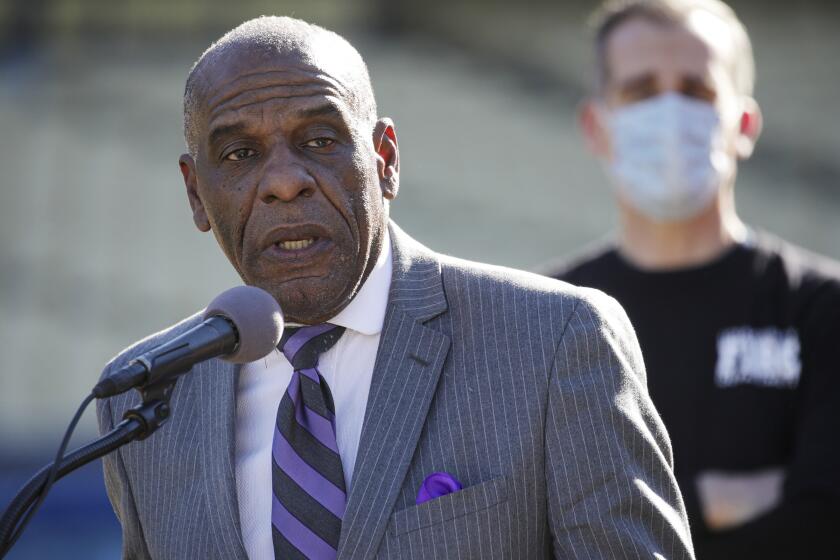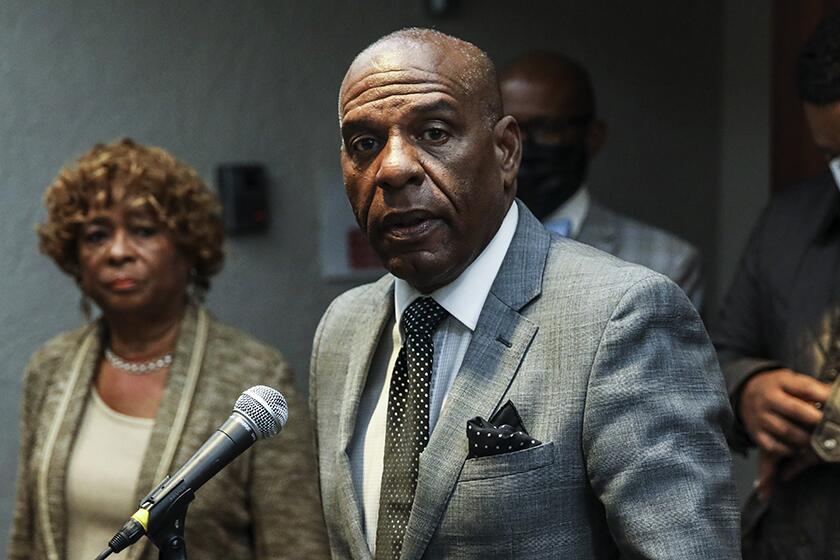Ebony Alert bill lauded by Black advocates as ‘historic’ step in rescuing missing children

- Share via
For the first time in the nation’s history, a statewide system will alert residents of missing Black youths, beginning Jan. 1.
California Gov. Gavin Newsom signed Senate Bill 673, also known as the “Ebony Alert,” into law Sunday.
The legislation enables the California Highway Patrol to authorize alerts announced on the changeable message signs along freeways if a vehicle is involved in a missing person incident.
The CHP can also contact media and use social media to disseminate a bulletin. Supporters of the legislation say young Black people have too often been classified as “runaways” and therefore get listed as missing less often under the current Amber Alert system.
Under the new law, the CHP will consider an alert for Black people ages 12 to 25 if the missing person suffers from a mental or physical disability, if there’s a threat of danger or if the individual is being trafficked.
Other circumstances include if the person has disappeared under unexplained or suspicious circumstances or even if there’s a danger due to environmental or weather conditions.
“Our Black children and young women are disproportionately represented on the lists of missing persons,” bill author state Sen. Steven Bradford (D-Gardena) said in a statement. “This is heartbreaking and painful for so many families and a public crisis for our entire state. The Ebony Alert can change this.”
State Sen. Steven Bradford (D-Gardena) introduced a bill to establish the ‘Ebony Alert’ system that would inform people of missing Black children and young women.
Bradford said statistics backed the need for an Ebony Alert.
The Maryland-based Black and Missing Foundation, a nonprofit organization dedicated to promoting awareness of disappeared people of color, noted that 39% of all missing children in the United States in 2022 were Black.
That percentage jumped 2 percentage points from a 2018 FBI report that put the number at 37%. Both percentages are not proportional to the Black population in the U.S., which sits at 14%.
The Congressional Black Caucus also released a report in 2020 showing that 40% of all sex trafficking victims were Black and 57.5% of all juvenile prostitution arrests are of Black children.
The bill received support from several advocacy groups, including the NAACP’s California Hawaii State Conference.
“It’s actually a historic bill,” conference President Rick Callender said in a Zoom call Wednesday morning. “If you look at what’s been happening to Black girls and women and children, this is necessary because we don’t get the same treatment and benefit as those with blond hair and blue eyes.”
The proposed Ebony Alert would work like an Amber Alert but would be triggered when a Black child or a young Black woman is missing.
Bradford’s bill specifically addressed what he considered the shortcomings of the Amber Alert system, which adheres to tighter restrictions than the Ebony Alert.
An Amber Alert, according to Bradford’s bill, is called for children who are missing and not deemed “runaways.”
Bradford notes in the legislation that Black children are “disproportionately classified as ‘runaways’ in comparison to their white counterparts and do not receive the Amber Alert.”
“Many of these decisions on if a Black child is considered a ‘runaway’ are based on societal stereotypes from people who don’t understand the Black community,” Callender said. “We see this in foster homes when social workers label Black kids as runaways instead of being snatched because they didn’t grow up in those circumstances.”
Bradford also noted that the Amber Alert system is only for children, while Ebony extends the age range to 25.
“Sen. Steven Bradford’s Ebony Alert legislation … is a step in the right direction and we hope it would encourage other legislators across the country to follow suit,” Natalie Wilson, co-founder of the Black and Missing Foundation, said in a statement. “It is important to continue to raise awareness about this issue and advocate for policies that prioritize finding missing people of color.”
More to Read
Sign up for Essential California
The most important California stories and recommendations in your inbox every morning.
You may occasionally receive promotional content from the Los Angeles Times.













